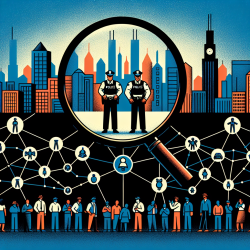The recent study titled "Identifying Misconduct-Committing Officer Crews in the Chicago Police Department" sheds light on a critical issue that has long plagued law enforcement agencies: the presence of officer crews that engage in coordinated misconduct. This research provides valuable insights into how these networks operate and their impact on policing. As practitioners in the field, understanding these dynamics is crucial for fostering accountability and reform.
The Findings: A Closer Look at Officer Crews
The study utilized a social network and machine learning approach to analyze data from the Chicago Police Department (CPD) spanning from 1971 to 2018. It identified approximately 160 potential officer crews, accounting for less than 4% of all officers but responsible for a disproportionate amount of alleged misconduct. These crews were linked to 25% of all use of force complaints and significant racial disparities in arrests and complaints.
Implications for Practitioners
For practitioners aiming to improve policing practices, this research offers several key takeaways:
- Recognize Group Dynamics: Policing is inherently group-based. Understanding how informal networks influence behavior can help identify potential misconduct early.
- Leverage Data Analytics: Utilize social network analysis to detect patterns of misconduct within departments. This proactive approach can aid in identifying problematic groups before they escalate.
- Foster a Culture of Accountability: Encourage transparency and accountability within departments. Implement policies that promote ethical behavior and discourage group-based misconduct.
- Engage in Continuous Learning: Stay informed about the latest research and methodologies in policing. Attend conferences, webinars, and workshops to enhance your understanding of these complex issues.
The Path Forward: Encouraging Further Research
The study's findings highlight the need for continued research into the dynamics of officer crews. By exploring how these networks form and operate, practitioners can develop more effective strategies for intervention and reform. Future studies could focus on the conditions that lead to crew formation and the impact of organizational culture on officer behavior.
To read the original research paper, please follow this link: Identifying misconduct-committing officer crews in the Chicago police department.










